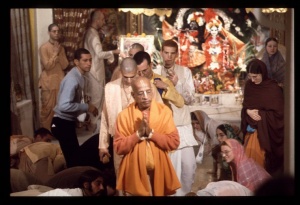CC Madhya 22.26: Difference between revisions
No edit summary |
(Vanibot #0054 edit - transform synonyms into clickable links, which search similar occurrences) |
||
| Line 17: | Line 17: | ||
<div class="synonyms"> | <div class="synonyms"> | ||
''cāri varṇa-āśramī'' | ''[//vanipedia.org/wiki/Special:VaniSearch?s=cāri&tab=syno_o&ds=1 cāri] [//vanipedia.org/wiki/Special:VaniSearch?s=varṇa&tab=syno_o&ds=1 varṇa]-[//vanipedia.org/wiki/Special:VaniSearch?s=āśramī&tab=syno_o&ds=1 āśramī]'' — followers of the four social and spiritual orders of life; ''[//vanipedia.org/wiki/Special:VaniSearch?s=yadi&tab=syno_o&ds=1 yadi]'' — if; ''[//vanipedia.org/wiki/Special:VaniSearch?s=kṛṣṇa&tab=syno_o&ds=1 kṛṣṇa]'' — Lord Kṛṣṇa; ''[//vanipedia.org/wiki/Special:VaniSearch?s=nāhi&tab=syno_o&ds=1 nāhi]'' — not; ''[//vanipedia.org/wiki/Special:VaniSearch?s=bhaje&tab=syno_o&ds=1 bhaje]'' — serve; ''[//vanipedia.org/wiki/Special:VaniSearch?s=sva&tab=syno_o&ds=1 sva]-[//vanipedia.org/wiki/Special:VaniSearch?s=karma&tab=syno_o&ds=1 karma] [//vanipedia.org/wiki/Special:VaniSearch?s=karite&tab=syno_o&ds=1 karite]'' — performing his duty in life; ''[//vanipedia.org/wiki/Special:VaniSearch?s=se&tab=syno_o&ds=1 se]'' — that person; ''[//vanipedia.org/wiki/Special:VaniSearch?s=raurave&tab=syno_o&ds=1 raurave]'' — in a hellish condition; ''[//vanipedia.org/wiki/Special:VaniSearch?s=paḍi’&tab=syno_o&ds=1 paḍi’]'' — falling down; ''[//vanipedia.org/wiki/Special:VaniSearch?s=maje&tab=syno_o&ds=1 maje]'' — becomes immersed. | ||
</div> | </div> | ||
Latest revision as of 22:55, 19 February 2024

A.C. Bhaktivedanta Swami Prabhupada
TEXT 26
- cāri varṇāśramī yadi kṛṣṇa nāhi bhaje
- svakarma karite se raurave paḍi’ maje
SYNONYMS
cāri varṇa-āśramī — followers of the four social and spiritual orders of life; yadi — if; kṛṣṇa — Lord Kṛṣṇa; nāhi — not; bhaje — serve; sva-karma karite — performing his duty in life; se — that person; raurave — in a hellish condition; paḍi’ — falling down; maje — becomes immersed.
TRANSLATION
"The followers of the varṇāśrama institution accept the regulative principles of the four social orders [brāhmaṇa, kṣatriya, vaiśya and śūdra] and four spiritual orders [brahmacarya, gṛhastha, vānaprastha and sannyāsa]. However, if one carries out the regulative principles of these orders but does not render transcendental service to Kṛṣṇa, he falls into a hellish condition of material life.
PURPORT
One may be a brāhmaṇa, kṣatriya, vaiśya or śūdra, or one may perfectly follow the spiritual principles of brahmacarya, gṛhastha, vānaprastha and sannyāsa, but ultimately one falls down into a hellish condition unless one becomes a devotee. Without developing one’s dormant Kṛṣṇa consciousness, one cannot be factually elevated. The regulative principles of varṇāśrama-dharma in themselves are insufficient for attainment of the highest perfection. That is confirmed in the following two quotations from Śrīmad-Bhāgavatam (11.5.2-3).